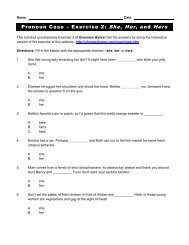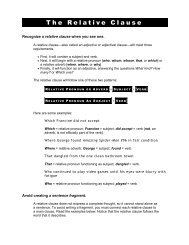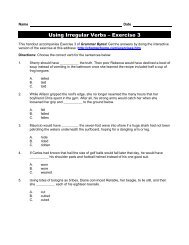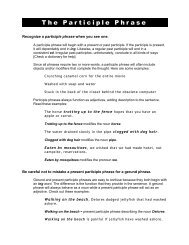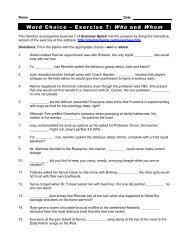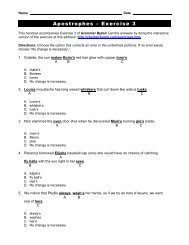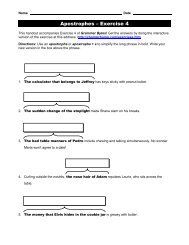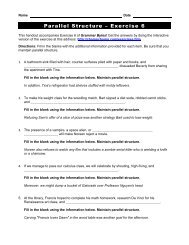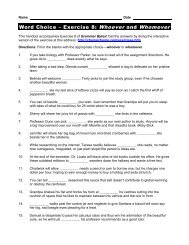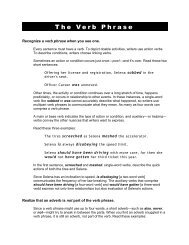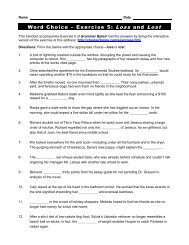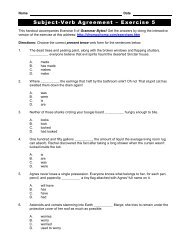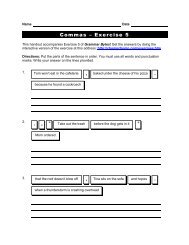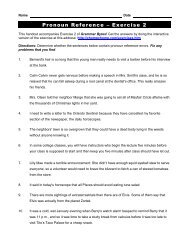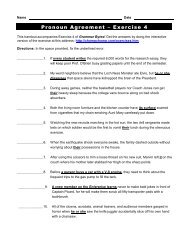The Participle
The Participle
The Participle
Create successful ePaper yourself
Turn your PDF publications into a flip-book with our unique Google optimized e-Paper software.
T h e P a r t i c i p l e<br />
Recognize a participle when you see one.<br />
<strong>Participle</strong>s come in two varieties: past and present. <strong>The</strong>y are two of the five forms<br />
or principal parts that every verb has. Look at the charts below.<br />
R e g u l a r V e r b s :<br />
V e r b<br />
S i m p l e<br />
P r e s e n t<br />
S i m p l e<br />
P a s t<br />
P a s t<br />
P a r t i c i p l e<br />
P r e s e n t<br />
P a r t i c i p l e<br />
I n f i n i t i v e<br />
giggle giggle(s) giggled giggled giggling to giggle<br />
help help(s) helped helped helping to help<br />
jump jump(s) jumped jumped jumping to jump<br />
I r r e g u l a r V e r b s :<br />
V e r b<br />
S i m p l e<br />
P r e s e n t<br />
S i m p l e<br />
P a s t<br />
P a s t<br />
P a r t i c i p l e<br />
P r e s e n t<br />
P a r t i c i p l e<br />
I n f i n i t i v e<br />
bring bring(s) brought brought bringing to bring<br />
ring ring(s) rang rung ringing to ring<br />
sing sing(s) sang sung singing to sing<br />
swim swim(s) swam swum swimming to swim<br />
Notice that each present participle ends in ing. This is the case 100 percent of the time.<br />
On the other hand, you can see that past participles do not have a consistent ending.<br />
<strong>The</strong> past participles of all regular verbs end in ed; the past participles of irregular verbs,<br />
however, vary considerably. If you look at bring and sing, for example, you'll see that<br />
their past participles—brought and sung—do not follow the same pattern even though<br />
both verbs have ing as the last three letters.<br />
Consult a dictionary whenever you are unsure of a verb's past participle form.<br />
Know the functions of participles.<br />
<strong>Participle</strong>s have three functions in sentences. <strong>The</strong>y can be components of multipart<br />
verbs, or they can function as adjectives or nouns.
P a r t i c i p l e s i n M u l t i p a r t Ver b s<br />
A verb can have as many as four parts. When you form multipart verbs, you use<br />
a combination of auxiliary verbs and participles. Look at the examples below:<br />
Our pet alligator ate Mrs. Olsen's poodle.<br />
Ate = simple past tense [no participle].<br />
With a broom, Mrs. Olsen was beating our alligator over<br />
the head in an attempt to retrieve her poodle.<br />
Was = auxiliary verb; beating = present participle.<br />
Our pet alligator has been stalking neighborhood pets<br />
because my brother Billy forgets to feed the poor reptile.<br />
Has = auxiliary verb; been = past participle; stalking = present participle.<br />
Our pet alligator should have been eating Gator Chow,<br />
crunchy nuggets that Billy leaves for him in a bowl.<br />
Should, have = auxiliary verbs; been = past participle; eating = present<br />
participle.<br />
P a r t i c i p l e s a s Ad j e c t i v e s<br />
Past and present participles often function as adjectives that describe nouns.<br />
Here are some examples:<br />
P a r t i c i p l e s a s No u n s<br />
<strong>The</strong> crying baby drew a long breath and sucked in a<br />
spider crouching in the corner of the crib.<br />
Which baby? <strong>The</strong> crying baby. Which spider? <strong>The</strong> one that<br />
was crouching in the corner.<br />
<strong>The</strong> mangled pair of sunglasses, bruised face, broken<br />
arm, and bleeding knees meant Genette had taken another<br />
spill on her mountain bike.<br />
Which pair of sunglasses? <strong>The</strong> mangled pair. Which face? <strong>The</strong> bruised<br />
one. Which arm? <strong>The</strong> broken one. Which knees? <strong>The</strong> bleeding ones.<br />
Present participles can function as nouns—the subjects, direct objects, indirect<br />
objects, objects of prepositions, and subject complements in sentences.<br />
Whenever a present participle functions as a noun, you call it a gerund.<br />
Take a look at these examples:
Sneezing exhausts Steve, who requires eight tissues and<br />
twenty-seven Gesundheits before he is done.<br />
Sneezing = the subject of the verb exhausts.<br />
Valerie hates cooking because scraping burnt gook out of<br />
pans always undermines her enjoyment of the food.<br />
Cooking = the direct object of the verb hates.<br />
We gave bungee jumping a chance.<br />
Bungee jumping = indirect object of the verb gave.<br />
Joelle bit her tongue instead of criticizing her prom date's<br />
powder blue tuxedo.<br />
Criticizing = object of the preposition instead of.<br />
Omar's least favorite sport is water-skiing because a bad<br />
spill once caused him to lose his swim trunks.<br />
Water-skiing = the subject complement of the verb is.<br />
©1997 - 2013 by Robin L. Simmons<br />
All Rights Reserved.



